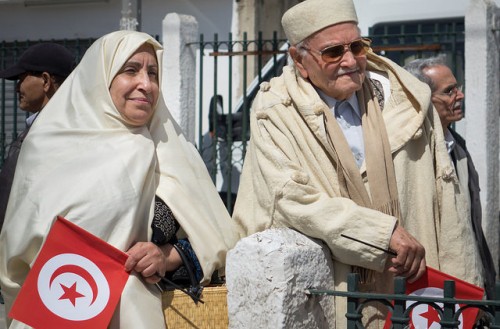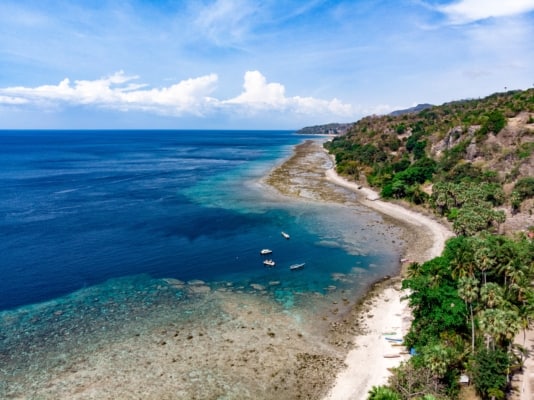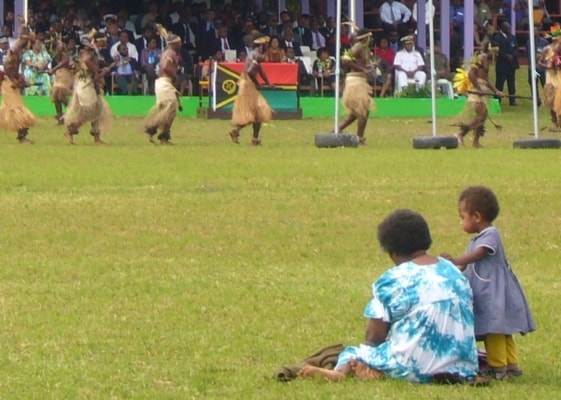Image: Tunisia protests 2013 (Photo: Tarek Mrad, Flickr).
Policymakers have long struggled with how to address the myriad challenges that plague fragile states. Some argue that building institutions is key. Others argue that other things matter more, such as establishing more legitimate processes to choose leaders, or improving the quality of political settlements. Still others look to human rights as the solution.
Yet we should not be blinded to the common objective of all these approaches: increasing inclusiveness in historically highly exclusive environments.
Stronger institutions would help the state serve more people equitably. Better political processes would help more people to participate. Better political settlements would yield more inclusive governments focused on broad-based development. Stronger human rights protection would ensure better treatment for those typically excluded or victimized.
The need for more inclusiveness also lies at the heart of the New Deal for Engagement in Fragile States and the United Nations Sustainable Development Goals. Both see inclusiveness as crucial for the promotion of stability and development.
None of this emphasis is accidental. Precisely because they lack social cohesion and robust institutions, fragile states are organized around exclusion and inequality. Political and social dynamics make these problems systemic and intractable—keeping countries unstable and underdeveloped in the process.
Countries such as Nigeria, South Sudan, Yemen, Iraq, and Pakistan have been unable to change their own longstanding exclusive dynamics despite substantial aid. While more robust states continue to reduce violence and poverty and, in all probability, make substantial progress towards the SDGs, fragile states like these are likely to be increasingly left behind. Already some two-fifths of global poverty is concentrated within the borders of fragile states even though they account for only one-fifth of the world’s population. The global poverty side of this ratio is not expected to fall. It is predicted to rise to two-thirds by 2030.
One could say that the developing world is rapidly diverging into two groups—states robust enough to maintain order and promote development, and states too fragile to do either. So why is it that almost everything the development community seeks to accomplish assumes that countries are either beyond fragility, or can become so within a reasonable period?
Only innovative approaches that yield more inclusive governments, social dynamics, or institutions—and ideally some combination of all three—can hope to catalyze the kind of internally generated reform that these countries desperately need. And transitions – started by the end of a conflict, a repressive regime’s demise, or a similar critical juncture – offer the best opportunities for such change.
How these windows of opportunity can be used to promote inclusiveness is the theme of a new publication I have co-authored with Mark Freeman. It offers practical ideas for how leaders at all levels of society can make the most of these periods. These are the moments when they can strengthen social cohesion, equity, and a sense of common nationhood while managing the tensions and divisions that a transition inevitably brings to the fore.
We argue that inclusiveness is the most important priority for transitions because, however difficult in practice, it is the only realistic way for fragile states to break the dysfunctional societal and institutional patterns that hold back change.
Every context is unique, and our framework is not intended to be a how-to guide. Instead we hope it offers developmental leaders a compass to help them prioritize and judge policies and actions. It suggests practical ways forward on inclusive policy-making in 10 priority areas, including the political, economic, administrative, legal, security and sociocultural spheres.
In times of transition, fragile and conflict-affected states need to find a new national path marked by more inclusive and cohesive practices; an enduring social covenant and social contract where either is absent or broken; and a more inclusive, overarching political identity and reality.
Over time, these factors can contribute to more responsive and accountable governance; to economic policies which generate shared growth and widespread benefits; to security and legal systems that work more equally for everyone; and to a social and cultural ethic that unites diverse populations and reduces discrimination and longstanding grievances.
This is undeniably difficult, but as countries like Spain, Chile, South Africa and Tunisia show, it is possible even in deeply divided societies to create the conditions for a more inclusive state and society. During a transition, determined political, social and business leaders who are genuinely willing to forge relationships and agreements with their adversaries can do much to help inclusiveness take root as a national good of enduring benefit to all citizens.
Certainly, every conceivable alternative is more likely than not to perpetuate the vicious cycle of exclusion and conflict that holds back fragile states.









